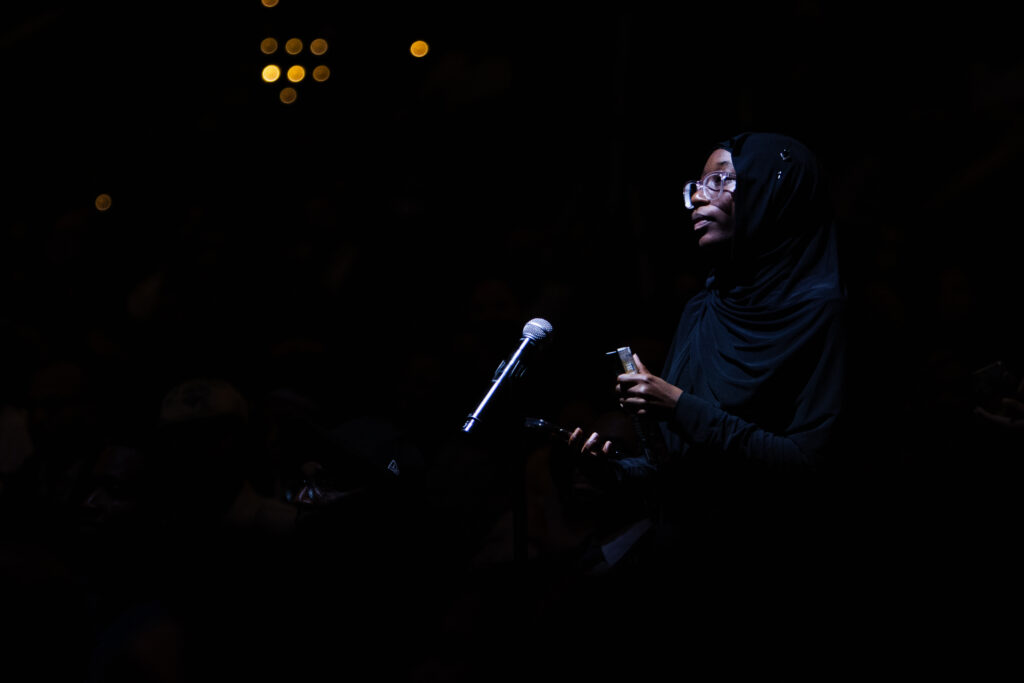
As author Ta-Nehisi Coates addressed the audience in Cramton Auditorium, he expressed his joy and pleasure to be back at Howard.
“I’m sorry I left you,” Coates said.
The current Sterling Brown Endowed Chair of Howard’s English department returned to campus on Thursday to discuss his new book, “The Message,” with Dr. Dana Williams, dean of the graduate school. The event, held by the Moorland-Spingarn Research Center, was made free to students, and 700 copies of the book were given out at no cost.
Williams emphasized the event would feature “a uniquely Howard conversation.” The audience consisted of students, faculty, Coates’ fans, family and friends. Notably, U.S. Representative Cori Bush and James Zogby, the first Arab-American to speak at the Democratic National Convention, were also in attendance.
Dr. Benjamin Talton, director of the Moorland-Spingarn, and Dr. Anthony Wutoh, Howard University Provost & Chief Academic Officer, opened the event with remarks. Rachel McCain, a senior TV & Film major and one of Coates’ former students, introduced him.
“Having him as a professor has fundamentally changed how I approach my writing, and I am forever grateful,” McCain said.
“The Message” marks Coates’ return to nonfiction and contains three essays, blending reporting and personal narrative. The first essay chronicles Coates’ first trip to Africa and Senegal. The second sees Coates traveling to Columbia, South Carolina and reporting on his books being banned. The final and longest essay details Coates’ trip to Palestine.
Coates says the book, which is dedicated to his students, spawned out of an essay he promised them about his trip to Senegal but then spiraled into something larger.
“I mean, it was the fact that the stakes were understood. All the students I had here at Howard University understood the connection between writing and politics,” Coates said..
The essay on Palestine has become a focal point of the book’s press tour. Since the Oct 7th, 2023 attacks on Israel by Hamas, over 40,000 Palestinians and 1,200 Israelis have reportedly been killed as of August, according to the Gaza Health Ministry.
In the summer of 2023, Coates visited the West Bank and Jerusalem. In the book, he draws parallels between what he saw and Jim Crow in the American South. Coates said that his editors thoroughly researched, and reached out to Israeli and Palestinian experts in anticipation of backlash to the book.
“We are not getting the full story. We don’t understand what we are invested in. How many of us know that every single fighter that drops a bomb on Gaza is an American fighter? We provided those, but not just the bombs, the planes. This is really us, and there are forces in the world that want to continue that bombing. They want to continue that war, want to continue that apartheid. And central to that is pushing the people who are victims of that system out of the frame. Not giving them the right to speak,” Coates said.
The book has also sparked a discussion on the media’s treatment of pro-Palestinian voices. A clip of Coates’ interview on the CBS Morning Show garnered over 27 million views on X. Coates said that although he was afraid to embark on the trip and write about it, he felt that he had a responsibility as a Black writer.
“[Frederick Douglass] published the narrative. He wrote at a time that he had siblings still enslaved. He wrote at a time when, at any moment, somebody could have dragged him back into slavery. What about Ida B. Wells? You know, the death sentence on her head, going back down South, repeatedly investigating lynching. Why are we here? What right do we have in 2023 to call ourselves in the tradition, and it’s like ‘We’re gonna look away because it makes us safe,’ but we didn’t get here by being safe. Our ancestors were not safe. So what right do we have to our safety?” Coates said.

Afterward, Coates only accepted student questions that ranged from how he measured the progress of Black people to how he cultivated a creative community at Howard. When a student posed a question about the themes of spirituality in his book, Coates smiled.
“Y’all are just as smart as I remember,” he said. “I probably will not hear a smarter question for the rest of the tour, and this is just the beginning.”
James Zogby, founder and president of the Arab American Institute, said he enjoyed the event. He recalled meeting Coates at the Democratic National Convention in August as a part of the Uncommitted National Movement, a group of Pro-Palestinian and anti-war Democratic delegates.
“I founded the Palestine Human Rights campaign and American-Arab Anti-Discrimination Committee. So, you know, I’ve had this sort of weight on my back the whole time. ‘You’re the Arab guy,’” said Zogby.
But when Coates approached Zogby at the DNC and told him, “I’ve always wanted to meet you,” it caught him off guard.
“I actually did a silly thing. I genuflected,” said Zogby. “I mean, I’ve revered his writing.”
The event ended with Coates and Williams revealing a QR code on the screen, announcing Coates’ will teach another Zora Neale Hurston Writers’ Workshop for students in November.
Copy edited by Juan Benn Jr.
































